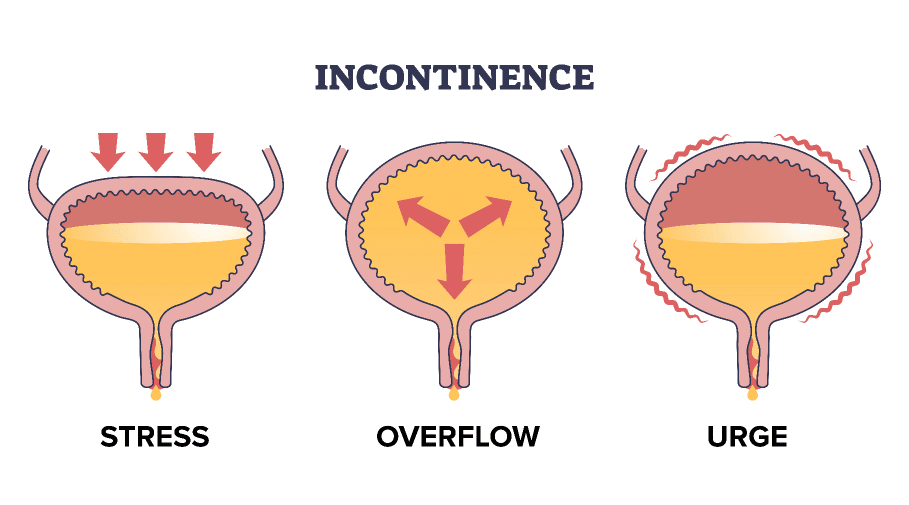Incontinence
Symptoms & Causes
Treatments & Procedures
Overview
Incontinence, bladder leakage, or loss of bladder control is a common problem. Ranging from occasional leakage when you sneeze to an intense urge to urinate that is uncontrollable. If you suffer from incontinence or bladder leakage, you know how frustrating and difficult it can be. Help for managing and treating urinary incontinence is available. If incontinence is compromising your enjoyment of life, Integrative Urology can diagnose the cause and provide you with treatment options.
Symptoms
• Leaking urine when coughing, sneezing, laughing, or exercising. • Feeling sudden, uncontrollable urges to urinate. • Frequent urination. • Waking up many times at night to urinate.• Urinating during sleep.
Types of urinary incontinence include::
• Urge incontinence: An intense need to urinate that is difficult to delay, often caused by an overactive bladder. • Stress incontinence: Often caused by activities such as sneezing, coughing, running, and jumping. • Overflow incontinence: The bladder doesn’t completely empty resulting in small amounts of urine leaking out over time rather than one sudden gush. • Mixed incontinence: A combination of problems such as stress incontinence and an overactive bladder.
When You Gotta Go - Incontinence Happens
Causes
An estimated 15 million men and women in the United States suffer from accidental bladder leakage. Incontinence is more common in women than in men and tends to worsen with age. Regardless of the cause, incontinence can rob you of your confidence and cause you to limit or avoid physical and social activities you used to enjoy.
In females, incontinence is frequently associated with past pregnancies or pelvic surgery. The strain of carrying and delivering a baby or undergoing pelvic surgery such as hysterectomy can weaken the muscles that close off the bladder. For men, a variety of issues may contribute to incontinence, but it is often related to treatment for prostate problems. In other cases, the bladder muscles or nerves become overactive, causing a strong urge to urinate even when there is little urine in the bladder.

Incontinence Care at Integrative Urology
Treatment
Urinary incontinence can be caused by a number of conditions and diseases, including diabetes, nervous system disorders, spinal cord injuries, stroke, side effects of medications, constipation, and weakening of the muscles that support and control bladder function.
Recommended treatment methods vary from patient to patient, but can include:
Medications
Many medications are available to help with incontinence and are generally considered first-line therapies to try. We encourage balancing the benefit of medication use with the side effects and possible long-term complications of the medications.
Exercises
Certain exercises such as “Kegel exercises” can be performed throughout the day and are used to strengthen the pelvic floor muscles. Specialized pelvic floor muscle therapy may also be useful.
Periurethral Injections
A small needle can be used to inject a bulking agent to help close the urethral mucosa.
Surgical Intervention
If other, less invasive treatment methods have failed, Dr. Hong can provide the most advanced surgical techniques available, including pelvic slings, InterStim™ and Botox® therapy.
Because the causes of incontinence vary so greatly, diagnosing and targeting the underlying cause is critical in order for treatment to be as effective as possible. Your individual treatment options will mostly depend on the cause and nature of the incontinence that you are experiencing.
Treatment for bladder issues is not a one-size-fits-all solution. At Integrative Urology you will receive an individualized treatment plan that addresses your specific needs and is compatible with your lifestyle.
